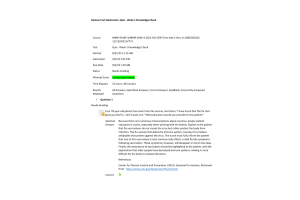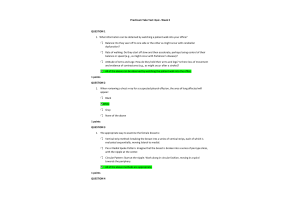NRNP 6540 Week 10 Knowledge Check; Musculoskeletal and Neurologic Disorders
- $20.00
- Question: Describe the difference between bursitis and tendinitis.
- Question: Your 68-year-old male complains of a hot, swollen, reddened MTP joint of the great toe. What is your primary diagnosis?
- Question: Restless legs syndrome (RLS) is a common neurological disorder characterized by an intense urge to move the legs (or sometimes the arms). Describe at least three symptoms or sensations of RLS.
- Question: Mary is a 79-year-old female who is post-menopausal and had refused to take hormone replacement therapy. Her vital signs are normal with slightly elevated BP today of 140/79, she states she is in pain 6/10. She is active around her home, and comes to the clinic complaining of back and hip pain after hanging new curtains and fell off her step ladder onto her kitchen floor. You suspect she has a fracture. What are the OLDCARTs questions you want to explore with her?
- Question: Peripheral neuropathy (PN) can be a sequalae of stroke or diabetes. List three of the cardinal symptoms of PN.
- Question: Mrs. G arrives for her annual exam, and you note that her height is 5 foot 6 inches, down 1 inch from 2 years ago. Describe at least three of the changes in the muscular system that are a part of the normal aging process.
- Question: Edgar is a 72-year-old male and is in the clinic for his annual examination. His vital signs are normal, and he is stable on his blood pressure medications and daily Flonase for seasonal allergies. He has no other complaints. You want to assess his gait as part of the Medicare Annual examination. List four (4) methods by which you will evaluate Edgar’s gait.
- Question: Ahmad is a 66-year-old male with a history of well controlled diabetes on metformin and takes ramipril for HTN. He also has a history of osteoarthritis for which he alternates Tylenol with Motrin daily. He states he was walking his dog, which he does every day, and the next day his right knee began to swell. Upon examination his knee is erythematous, swollen, and tender. List at least three differential diagnoses for Ahmad’s swollen knee.
- Question: Describe a cognitive screening test that measures the status of a patient’s attention, concentration, executive function, memory, and orientation.
- Question: Your 88-year-old patient has chronic gout. You know that gout is an inflammatory disease associated with malfunctioning metabolism of purine, leading to overproduction or underexcretion of uric acid, results in deposits of sodium urate crystals in the joints, periarticular tissues, subcutaneous tissues, and kidneys. List the known prevalence of gout by age group, ethnicity, and gender.






















